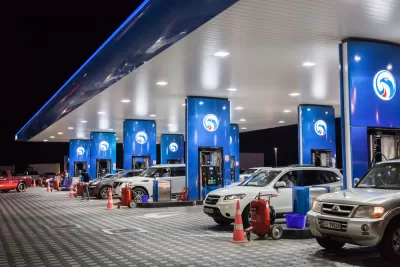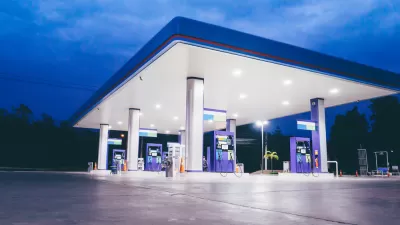The Grand Old Party platform calls for an end to using gas taxes for public transit as well as other non-road purposes like "bike-sharing," opposes increases to the 23-year-old gas tax, and would eliminate the U.S. DOT Livability Initiative.

Progressive Railroading reported on the American Public Transportation Association's position on the newly adopted Republican platform.
Adopted by Republicans on Monday, the GOP platform proposes to eliminate mass transit dollars from the federal Highway Trust Fund.
That proposal would "undo more than 30 years of overwhelming support for dedicated federal investment in public transit," APTA Acting President and Chief Executive Officer Richard A. White said yesterday in a prepared statement.
Referring to the Highway Trust Fund, page five of the Republican platform [PDF] states:
One fifth of its funds are spent on mass transit, an inherently local affair that serves only a small portion of the population, concentrated in six big cities. Additional funds are used for bike-share programs, sidewalks, recreational trails, landscaping, and historical renovations...These worthwhile enterprises should be funded through other sources."
We propose to phase out the federal transit program and reform provisions of the National Environmental Policy Act [NEPA] which can delay and drive up costs for transportation projects.
The Mass Transit Account dates back to legislation signed by President Ronald Reagan, the 1982 Surface Transportation Assistance Act.
For the record, it is closer to 15 percent*, not 20 percent, of fuel tax funds that are directed to the Mass Transit Account.** According to the American Public Transportation Association (APTA) "Primer on Transit Funding," December 2015 [page 22 of PDF]:
The current share of the tax on gasoline is 15.5 percent to the Mass Transit Account, 83.9 percent to the Highway Account, and 0.6 percent to the Leaking Underground Storage Tank Trust Fund. The current share of the tax on diesel fuel is 11.7 percent to the Mass Transit Account, 87.9 percent to the Highway Account, and 0.4 percent to the Leaking Underground Storage Tank Trust Fund.
The platform also speaks to what they call the Democrats' 'social engineering' orientation:
The current Administration...subordinates civil engineering to social engineering as it pursues an exclusively urban vision of dense housing and government transit. Its ill-named Livability Initiative is meant to “coerce people out of their cars.”
This is the same mentality that once led Congress to impose by fiat a single maximum speed limit for the entire nation, from Manhattan to Montana.
Like the Mass Transit Account that traces back to President Reagan, the 55 mph speed limit dates back to another Republican president, Richard Nixon, who signed the Emergency Highway Energy Conservation Act. Of course, it was a different "energy era" then, with the onset of the Organization of Petroleum Exporting Countries (OPEC) Oil Embargo after the Arab-Israeli War that year.
Motorists have been enjoying the fruits of an oil glut since the summer of 2014, and gas prices are projected to remain low until the EIA expects global oil inventory draws to begin in the third quarter of 2017, according to the Energy Information Administration.
The lowest gas prices in 11 years would appear to be an ideal time to raise the federal gas tax, unchanged since 1993, but the Republican platform opposes increasing it. APTA is on record as supporting an increase in the tax as its "purchasing power has gone down by more than 37 percent," states White.
The Washington Post also reports on the anti-transit position of the Republican platform, noting the irony that Donald Trump "loves trains" and that "transit was key in bringing the RNC to Cleveland."
Footnotes:
*"The Mass Transit Account in the Highway Trust Fund was established in the 1982 Surface Transportation Assistance Act of 1982 to receive part of the motor-fuel tax," according to the Federal Highway Administration.
** "Effective October 1, 1997, the deposit to the Mass Transit Account is 2.86 cents per gallon of most taxable highway motor fuels," according to the FHWA.
Hat tip to Clyde Anderson
FULL STORY: APTA opposed to GOP's call to end federal funding of public transportation

Study: Maui’s Plan to Convert Vacation Rentals to Long-Term Housing Could Cause Nearly $1 Billion Economic Loss
The plan would reduce visitor accommodation by 25,% resulting in 1,900 jobs lost.

Alabama: Trump Terminates Settlements for Black Communities Harmed By Raw Sewage
Trump deemed the landmark civil rights agreement “illegal DEI and environmental justice policy.”

Why Should We Subsidize Public Transportation?
Many public transit agencies face financial stress due to rising costs, declining fare revenue, and declining subsidies. Transit advocates must provide a strong business case for increasing public transit funding.

Paris Bike Boom Leads to Steep Drop in Air Pollution
The French city’s air quality has improved dramatically in the past 20 years, coinciding with a growth in cycling.

Why Housing Costs More to Build in California Than in Texas
Hard costs like labor and materials combined with ‘soft’ costs such as permitting make building in the San Francisco Bay Area almost three times as costly as in Texas cities.

San Diego County Sees a Rise in Urban Coyotes
San Diego County experiences a rise in urban coyotes, as sightings become prevalent throughout its urban neighbourhoods and surrounding areas.
Urban Design for Planners 1: Software Tools
This six-course series explores essential urban design concepts using open source software and equips planners with the tools they need to participate fully in the urban design process.
Planning for Universal Design
Learn the tools for implementing Universal Design in planning regulations.
Smith Gee Studio
Alamo Area Metropolitan Planning Organization
City of Santa Clarita
Institute for Housing and Urban Development Studies (IHS)
City of Grandview
Harvard GSD Executive Education
Toledo-Lucas County Plan Commissions
Salt Lake City
NYU Wagner Graduate School of Public Service



























